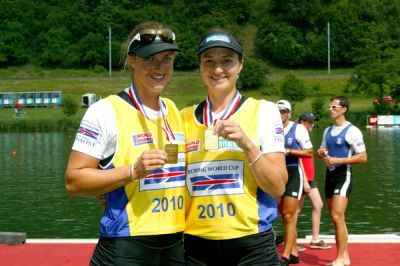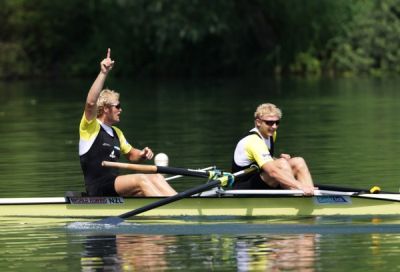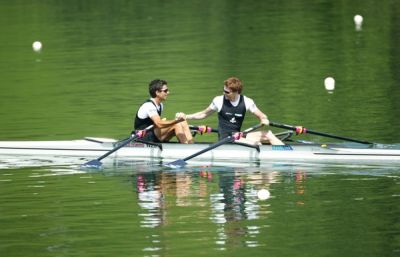An amazing day on the Rotsee saw New Zealand take three gold, one silver and two bronze medals at the final World Cup regatta in Lucerne before the rowing world championships head to Lake Karapiro in October.
Four time world champion Mahé Drysdale capped a great return to the sport after injury with a fighting third place in the men's single sculls, just a fraction down on Ondrej Synek and Alan Campbell. With so much of his pre-season training missed due to a back injury, third was an excellent result, especially when he defeated Olympic champion Olaf Tufte in the process. He was never out of the race, and looked strong in the dash for the line. Time in the boat now before Karapiro will only make him stronger.
The women's pair of Rebecca Scown and Juliette Haigh, the men's pair of Hamish Bond and Eric Murray and the lightweight double scull of Peter Taylor and Storm Uru all struck gold, with the Men's 'A' four taking a stunning silver and the heavyweight men's double scull of Nathan Cohen and Joseph Sullivan turning in a superb row to take bronze, just a whisker away from second. The two pairs and the light double were also crowned World Cup winners after great seasons, with the two pairs unbeaten in all international racing.
Scown and Haigh opened the Kiwi account with a dominant win in the women's pair, vanquishing the Bled winners Canada in a superb display of technical, smooth rowing. Striking 38 strokes per minute throughout the race, they simply rowed away from the field to establish a clear water lead which nobody ever looked like challenging.
Moments later world champions Eric Murray and Hamish Bond were away from the start, and immediately in a fight with the fast starting Greeks and - for the tenth time - their arch rivals Andrew Triggs Hodge and Peter Reed. With similar semi final times, the Kiwis knew they had to raise the bar, and they rowed the best race of their season to move through the field and take a commanding lead in the second 500 metres. Once again, nobody had an answer for their mid-race pace and as they sprinted to the finish line, the British were clear water behind, with the Greeks a little further back and the rest of the field even further adrift. The pair - unbeaten for two seasons now - readily admit they know they can find even more speed in the build up to Karapiro and they have now established themselves as one of the sport's great crews.
Next up in a golden hour for New Zealand Rowing were the lightweight double scull world champions Peter Taylor and Storm Uru. After their second place in Munich and a week or two of speed work they were confident they could take the fight to the Olympic champions Great Britain, but the reality was that the Brits were rowed out of the picture very early indeed and the race became a fight between the powerful Canadians and the New Zealanders. Taylor and Uru always looked more efficient and more controlled and through the middle of the race maintained their effective pace as the Canadians tired. Through the final 500 metres, they took a clear water lead and romped home a good distance ahead of the Canadians. "This was a great way to set ourselves up for Karapiro and we still feel there are lots of areas we can improve," said Taylor. "It's been great to be part of a very big day for the team as well."
With two crews in the final of the men's coxless fours, there were high hopes of a medal but no clear indication of which boat might do it. 500 metres into the race and New Zealand looked odds on for two medals, with the British world champions holding a slight lead ahead of the Kiwi 'A' boat of David Eade, Hamish Burson, Jade Uru and Sean O'Neill and the 'B' boat of Ben Hammond, Ian Seymour, Chris Harris and Tyson Williams. The 'B' crew had demonstrated real speed in winning the heat and were arguably fresher than the 'A' crew that had done one more race, but a start that was perhaps a little too conservative left them chasing their team mates and the British, and they also had their hands full with the French four, who were having a great row in fourth. Into the final third of the race, and the British used their power to pull away a little as the two Kiwi crews continued the fight to stay ahead of the French. Into the final 500 metres, and the 'A' crew once again raised its game as it had in the semi and started to attack the British, as did the French with the 'B' boat. As the crews all surged across the line just a few seconds apart, Britain took the gold, with the New Zealand 'A' crew second, the French third and the 'B' crew fourth. Amazing stuff from a young group that will now head to final trials in New Zealand in what will be a fascinating process to decide the best combination for the world championships.
The men's heavyweight double scull of Joseph Sullivan and Nathan Cohen put a disappointing regatta in Munich behind them and were right at the sharp end of the field throughout the final in Lucerne. They may not have quite the technical prowess of the French or British combinations just yet, but they showed they can race with a very solid third place.
The women's quad completed a solid weekend with a sixth place finish in the main final.








